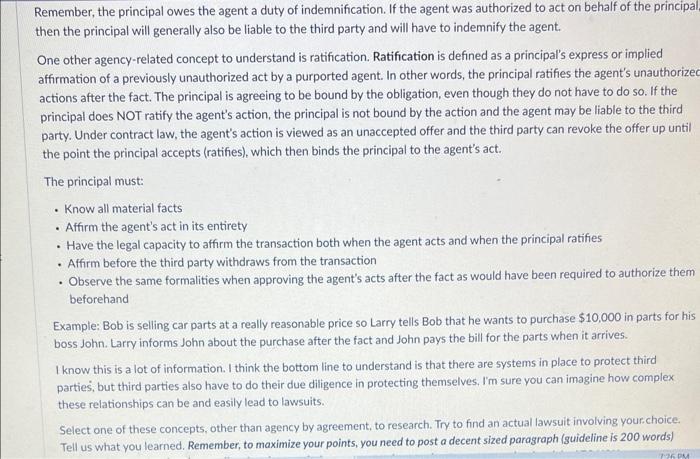Answered step by step
Verified Expert Solution
Question
1 Approved Answer
help Remember, the principal owes the agent a duty of indemnification. If the agent was authorized to act on behalf of the principa then the
help 
Remember, the principal owes the agent a duty of indemnification. If the agent was authorized to act on behalf of the principa then the principal will generally also be liable to the third party and will have to indemnify the agent. One other agency-related concept to understand is ratification. Ratification is defined as a principal's express or implied affirmation of a previously unauthorized act by a purported agent. In other words, the principal ratifies the agent's unauthorize actions after the fact. The principal is agreeing to be bound by the obligation, even though they do not have to do so. If the principal does NOT ratify the agent's action, the principal is not bound by the action and the agent may be liable to the third party. Under contract law, the agent's action is viewed as an unaccepted offer and the third party can revoke the offer up until the point the principal accepts (ratifies), which then binds the principal to the agent's act. The principal must: - Know all material facts - Affirm the agent's act in its entirety - Have the legal capacity to affirm the transaction both when the agent acts and when the principal ratifies - Affirm before the third party withdraws from the transaction - Observe the same formalities when approving the agent's acts after the fact as would have been required to authorize them beforehand Example: Bob is selling car parts at a really reasonable price so Larry tells Bob that he wants to purchase $10,000 in parts for his boss John. Larry informs John about the purchase after the fact and John pays the bill for the parts when it arrives. I know this is a lot of information. I think the bottom line to understand is that there are systems in place to protect third parties, but third parties also have to do their due diligence in protecting themselves. I'm sure you can imagine how complex. these relationships can be and easily lead to lawsuits. Select one of these concepts, other than agency by agreement, to research. Try to find an actual lawsuit involving your. choice. Tell us what you learned. Remember, to maximize your points, you need to post a decent sized paragraph (guideline is 200 words) Remember, the principal owes the agent a duty of indemnification. If the agent was authorized to act on behalf of the principa then the principal will generally also be liable to the third party and will have to indemnify the agent. One other agency-related concept to understand is ratification. Ratification is defined as a principal's express or implied affirmation of a previously unauthorized act by a purported agent. In other words, the principal ratifies the agent's unauthorize actions after the fact. The principal is agreeing to be bound by the obligation, even though they do not have to do so. If the principal does NOT ratify the agent's action, the principal is not bound by the action and the agent may be liable to the third party. Under contract law, the agent's action is viewed as an unaccepted offer and the third party can revoke the offer up until the point the principal accepts (ratifies), which then binds the principal to the agent's act. The principal must: - Know all material facts - Affirm the agent's act in its entirety - Have the legal capacity to affirm the transaction both when the agent acts and when the principal ratifies - Affirm before the third party withdraws from the transaction - Observe the same formalities when approving the agent's acts after the fact as would have been required to authorize them beforehand Example: Bob is selling car parts at a really reasonable price so Larry tells Bob that he wants to purchase $10,000 in parts for his boss John. Larry informs John about the purchase after the fact and John pays the bill for the parts when it arrives. I know this is a lot of information. I think the bottom line to understand is that there are systems in place to protect third parties, but third parties also have to do their due diligence in protecting themselves. I'm sure you can imagine how complex. these relationships can be and easily lead to lawsuits. Select one of these concepts, other than agency by agreement, to research. Try to find an actual lawsuit involving your. choice. Tell us what you learned. Remember, to maximize your points, you need to post a decent sized paragraph (guideline is 200 words) 
Step by Step Solution
There are 3 Steps involved in it
Step: 1

Get Instant Access to Expert-Tailored Solutions
See step-by-step solutions with expert insights and AI powered tools for academic success
Step: 2

Step: 3

Ace Your Homework with AI
Get the answers you need in no time with our AI-driven, step-by-step assistance
Get Started


